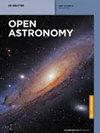全电力推进地球同步轨道卫星轨道转移控制的智能防撞策略
IF 0.5
4区 物理与天体物理
Q4 ASTRONOMY & ASTROPHYSICS
引用次数: 0
摘要
全电力推进地球静止轨道(GEO)卫星具有发射成本低、控制精度高、运行寿命长等特点,已成为全球航空航天研究的一个焦点。在轨道转移控制过程中,该卫星在低地球轨道、中地球轨道和地球同步轨道等不同轨道上不断进行微弱机动,与其他空间物体之间可能产生 "织网 "效应,从而大大增加了碰撞风险。为有效降低碰撞风险,本文提出了基于偏离轨道的碰撞预警分析策略。通过预警空间域间隔等级分类、偏离轨道覆盖计算和控制参数动态分析,确保碰撞预警成功率达到 100%。此外,还建立了基于偏离轨道控制策略的防撞算法,通过精确标定电推力、优化偏离轨道控制策略和自主生成控制策略,确保防撞成功率达到 100%。此外,还设计了基于轨道预测误差补偿的动态智能防撞模型。通过构建轨道预测误差分析模型、误差学习模型和误差补偿模型,修正了轨道模型中的扰动误差,使预测精度提高了 25% 以上。实验结果验证了所提方法的正确性和有效性,确保了全电力推进地球同步轨道卫星轨道转移控制过程中碰撞预警和规避的安全要求。本文章由计算机程序翻译,如有差异,请以英文原文为准。
Intelligent collision avoidance strategy for all-electric propulsion GEO satellite orbit transfer control
The all-electric propulsion Geostationary Earth Orbit (GEO) satellite, characterized by its low launch cost, high precision control, and long operational lifespan, has become a focal point in aerospace research worldwide. During its orbital transfer control, this satellite continuously performs weak maneuvers across various orbits including LEO, MEO, and GEO, creating a potential “weavin” effect with other space objects, thereby dramatically increasing the risk of collisions. To effectively mitigate collision risks, this article proposes a collision warning analysis strategy based on deviation orbits. Through the categorization of warning space domain interval level, deviation orbit coverage calculation, and dynamic analysis of control parameters, a collision warning success rate of 100% is ensured. In addition, a collision avoidance algorithm based on deviation orbit control strategy is established, ensuring a 100% success rate in collision avoidance through precision calibration of electric thrust, optimization of deviation orbit control strategy, and autonomous generation of control strategy. Furthermore, a dynamic intelligent collision avoidance model based on orbit prediction error compensation is designed. By constructing an orbit prediction error analysis model, error learning model, and error compensation model, perturbation error in the orbit model are corrected, leading to an accuracy improvement of over 25% in prediction. The experimental results validate the correctness and effectiveness of the proposed methods, ensuring the safety requirements for collision warning and avoidance during the orbital transfer control process of all-electric propulsion GEO satellites.
求助全文
通过发布文献求助,成功后即可免费获取论文全文。
去求助
来源期刊

Open Astronomy
Physics and Astronomy-Astronomy and Astrophysics
CiteScore
1.30
自引率
14.30%
发文量
37
审稿时长
16 weeks
期刊介绍:
The journal disseminates research in both observational and theoretical astronomy, astrophysics, solar physics, cosmology, galactic and extragalactic astronomy, high energy particles physics, planetary science, space science and astronomy-related astrobiology, presenting as well the surveys dedicated to astronomical history and education.
 求助内容:
求助内容: 应助结果提醒方式:
应助结果提醒方式:


